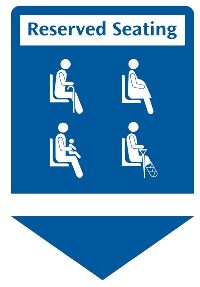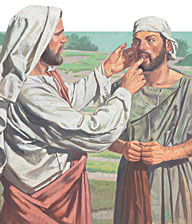Sunday Lectionary: The deaf will hear
Twenty-third Sunday in Ordinary Time: September 9th, 2012
In our First Reading this week Isaiah consoles Israel, promising a time will come when wrongs will be made right, when “the ears of the deaf [will] be cleared” and the dry lands be refreshed. From the very beginning of the Bible, a Saviour was promised, a Messiah who would heal the rupture between man and God. Isaiah’s words find their fulfillment in this Sunday’s Gospel Reading as Jesus restores a man’s hearing, a sign that the long awaited Messiah had finally come…

Reading I: Isaiah 35:4-7a
Isaiah is one of the Major Prophets of the Old Testament. He was born in 760 BC, most likely to a rich and priestly family. He lived in Jerusalem with his wife and two children. He received a vision while in the Jerusalem Temple in 742 BC. In response to the unfaithfulness of the people he proclaimed the coming downfall of the Kingdom.
The book of Isaiah is divided into three parts and our First Reading this week comes from the middle section in which, after God’s judgement, Isaiah offers consolation to the people.
Thus says the LORD: Say to those whose hearts are frightened: Be strong, fear not! Here is your God, he comes with vindication; with divine recompense he comes to save you. Then will the eyes of the blind be opened, the ears of the deaf be cleared; then will the lame leap like a stag, then the tongue of the mute will sing. Streams will burst forth in the desert, and rivers in the steppe. The burning sands will become pools, and the thirsty ground, springs of water.

Questions:
- What is the context of this passage?
- What is the message delivered by God through His prophet?
- How would this message have brought hope?
- How was Isaiah’s prophecy fulfilled by Jesus? How does this relate to the Gospel Reading?
- How can we apply to this to our lives today?
Commentary:
Thus says the LORD: …
This is what prophets say prior to delivering a message from the Lord.
Say to those whose hearts are frightened: Be strong, fear not! Here is your God, he comes with vindication; with divine recompense he comes to save you.
This is Messianic language. Trust in the Lord.
Then will the eyes of the blind be opened, the ears of the deaf be cleared; then will the lame leap like a stag, then the tongue of the mute will sing.
God will reverse misfortune.
When John the Baptist sent his disciples to ascertain Jesus’ identity, Jesus said:
Jesus replied, “Go back and report to John what you hear and see: The blind receive sight, the lame walk, those who have leprosy are cleansed, the deaf hear, the dead are raised, and the good news is proclaimed to the poor. – Matthew 11:4-5
It was clear from Jesus’ response that the Messianic age had arrived.
Streams will burst forth in the desert, and rivers in the steppe. The burning sands will become pools, and the thirsty ground, springs of water.
The barren land will be flooded with water.
“steppe” is another word for “wilderness”.
Responsorial Psalm: Psalm 146:7, 8-9, 9-10
Our Psalm this week speaks about the liberating power of God.
R. (1b) Praise the Lord, my soul!
The God of Jacob keeps faith forever, secures justice for the oppressed, gives food to the hungry. The LORD sets captives free.
The LORD gives sight to the blind; the LORD raises up those who were bowed down. The LORD loves the just; the LORD protects strangers.
The fatherless and the widow the LORD sustains, but the way of the wicked he thwarts. The LORD shall reign forever; your God, O Zion, through all generations. Alleluia.
Questions:
- What is the theme of the psalm?
- Whom does the Lord help?
- How does this psalm relate to the other Readings?
Commentary:
R. (1b) Praise the Lord, my soul!
The appropriate response to God’s saving work is praise.
The God of Jacob keeps faith forever, secures justice for the oppressed, gives food to the hungry. The LORD sets captives free.
The Lord is faithful. He protects the oppressed, the hungry and the captives…
The LORD gives sight to the blind; the LORD raises up those who were bowed down. The LORD loves the just; the LORD protects strangers.
…the blind, the crushed, the righteous, the alien….
The fatherless and the widow the LORD sustains, but the way of the wicked he thwarts. The LORD shall reign forever; your God, O Zion, through all generations. Alleluia.
…the orphan and widow (remember last week’s Second Reading about “Pure Religion”?).
Reading II: James 2:1-5
As we saw last week, the Epistle of St. James focuses on Christian living. In today’s passage, St. James considers the subject of partiality…
My brothers and sisters, show no partiality as you adhere to the faith in our glorious Lord Jesus Christ. For if a man with gold rings and fine clothes comes into your assembly, and a poor person in shabby clothes also comes in, and you pay attention to the one wearing the fine clothes and say, “Sit here, please, ” while you say to the poor one, “Stand there, ” or “Sit at my feet, ” have you not made distinctions among yourselves and become judges with evil designs?
Listen, my beloved brothers and sisters. Did not God choose those who are poor in the world to be rich in faith and heirs of the kingdom that he promised to those who love him?

Questions:
- What does St. James say should have no place among Christians?
- What does “partiality” mean?
- What example does he give? How do you think St. James chose this example?
- What is the issue at hand in the example he gives?
- What is the rhetorical question James asks at the end of this passage? What is his point?
- How do you react when meeting somebody rich and powerful. How do you react when you meet someone who is poor?
Commentary:
My brothers and sisters, …
James is speaking to fellow Christians here.
Whenever he uses the phrase “brothers and sisters”, you know he’s about to exhort his readers in some way… 😉
…show no partiality as you adhere to the faith in our glorious Lord Jesus Christ.
“partially“ should not be found among Christians. “[P]artiality” is another word for bias or favouritsm.
In this matter we should imitate God:
For God does not show favoritism. – Romans 2:11
Anyone who does wrong will be repaid for their wrongs, and there is no favoritism. – Colossians 3:25
And masters, treat your slaves in the same way. Do not threaten them, since you know that he who is both their Master and yours is in heaven, and there is no favoritism with him – Ephesians 6:9
Our Lord gave no preference to the rich and the powerful and neither should we. Such prejudice should not be in us. In fact, as James goes on to say later, this violates the Levitical law of charity. Instead, we should treat every person with the dignity which comes from being made in the image and likeness of God.
For if a man with gold rings and fine clothes comes into your assembly, and a poor person in shabby clothes also comes in, and you pay attention to the one wearing the fine clothes and say, “Sit here, please, ” while you say to the poor one, “Stand there, ” or “Sit at my feet, ” have you not made distinctions among yourselves and become judges with evil designs?
By treating the two men differently they have judged themselves.
Although this scenario is presented as a hypothetical, I am of the suspicion that St. James actually witnessed an incident like this in the Jerusalem Church or in a synagogue.
Listen, my beloved brothers and sisters. Did not God choose those who are poor in the world to be rich in faith and heirs of the kingdom that he promised to those who love him?
God’s special care of the poor is expressed here, as it is in other parts of the Bible:
My whole being will exclaim, “Who is like you, Lord? You rescue the poor from those too strong for them, the poor and needy from those who rob them.” – Psalm 35:10
“Blessed are the poor in spirit, for theirs is the kingdom of heaven…” – Matthew 5:3
It’s not that poverty itself is a blessing, but that the poor themselves are predisposed to put their trust God since they cannot put their trust in their own wealth.
Gospel: Mark 7:31-37
We continue through Mark’s Gospel. We pick up the story shortly after last week’s Gospel Reading. In today’s passage Jesus heals a man who is both deaf and mute. This is an incident which is only recorded in Mark’s Gospel.
Again Jesus left the district of Tyre and went by way of Sidon to the Sea of Galilee, into the district of the Decapolis. And people brought to him a deaf man who had a speech impediment and begged him to lay his hand on him. He took him off by himself away from the crowd. He put his finger into the man’s ears and, spitting, touched his tongue; then he looked up to heaven and groaned, and said to him, “Ephphatha!”– that is, “Be opened!” — And immediately the man’s ears were opened, his speech impediment was removed, and he spoke plainly. He ordered them not to tell anyone. But the more he ordered them not to, the more they proclaimed it. They were exceedingly astonished and they said, “He has done all things well. He makes the deaf hear and the mute speak.”

Questions:
- To what area does Jesus journey? Is there any significance to this?
- Who is brought to Jesus?
- Why do you think Jesus took him away from the crowd?
- Could Jesus have healed the man with a word? If so, why didn’t He? Why did he touch and spit?
- What clues are there that Mark wrote for a non-Jewish audience?
- Why did Jesus tell them to not tell anyone?
Commentary:
Again Jesus left the district of Tyre and went by way of Sidon…
Jesus had just healed a Canaanite woman’s daughter (Mark 7:24-30).
“Tyre” and “Sidon” were Gentile regions.
…to the Sea of Galilee, into the district of the Decapolis.
Another Gentile region (it was a confederation of ten cities).
And people brought to him a deaf man who had a speech impediment and begged him to lay his hand on him.
It is interesting to note that the laying on of hands is not mentioned in the Old Testament. However, it is extremely common in the New Testament.
The Greek word behind “speech impediment” is “mogilalon”. This word is found in the Bible in only one other place, the Greek (Septuagint) version of our First Reading. It’s clear Mark has the Isaiah passage in mind: “Here is your God, he comes with vindication”
He took him off by himself away from the crowd.
Jesus takes the man away from the crowd. This was probably an attempt to keep the healing quiet:
He takes the deaf and dumb man who was brought to Him apart from the crowd, that He might not do His divine miracles openly; teaching us to cast away vain glory and swelling of heart, for no one can work miracles as he can, who loves humility and is lowly in his conduct. – Pseudo-Chrys., Vict. Ant. e Cat. in Marc.
He put his finger into the man’s ears and, spitting, touched his tongue; …
This is extremely sacramental. Jesus could have just healed the man with a word, but instead He chose to use material things in this healing.
But He puts His fingers into his ears, when He might have cured him with a word, to shew that His body, being united to Deity, was consecrated by Divine virtue, with all that He did. For since on account of the transgression of Adam, human nature had incurred much suffering and hurt in its members and senses, Christ coming into the world shewed the perfection of human nature in Himself, and on this account opened ears, with His fingers, and gave the power of speech by His spittle – Pseudo-Chrys., Vict. Ant. e Cat. in Marc.
“The Spirit is called the finger of God. When the Lord puts his fingers into the ears of the deaf mute, he was opening the soul of man to faith through the gifts of the Holy Spirit“ – Gregory the Great (540-604 AD)
That He might shew that all the members of His sacred body are divine and holy, even the spittle which loosed the string of the tongue. For the spittle is only the superflous moisture of the body, but in the Lord, all things are divine. – Theophylact
…then he looked up to heaven and groaned, …
He looked up to heaven, that He might teach us that thence is to be procured speech for the dumb, hearing for the deaf, health for all who are sick. And He sighed, not that it was necessary for Him to be any thing from His Father with groaning, for He, together with the Father, gives all things to them who ask, but that He might give us an example of sighing, when for our own errors and those of our neighbours, we invoke the guardianship of the Divine mercy. – St. Bede
He at the same time also groaned, as taking our cause upon Himself and pitying human nature, seeing the misery into which it had fallen. – Pseudo-Chrys., Vict. Ant. e Cat. in Marc.
…and said to him, “Ephphatha!”– that is, “Be opened!” —
The word “Ephphatha” is Aramaic. As we mentioned last week, the presence of translations in the text indicates that Mark’s Gospel is intended for a Gentile audience.
…And immediately the man’s ears were opened, his speech impediment was removed, and he spoke plainly.
Isaiah’s prophecy (First Reading) is fulfilled.
He ordered them not to tell anyone.
There are a few possible reasons for Jesus’ secrecy:
1. Jesus didn’t want to develop a sensationalist reputation.
2. Jesus wanted to avoid the expectation that the Messiah would be political figure.
3. Jesus didn’t want to stir things up until it was time for His Passion.
By which He has taught us not to boast in our powers, but in the cross and humiliation. He also bade them conceal the miracle, lest He should excite the Jews by envy to kill Him before the time. – Pseudo-Chrysostom, Vict. Ant. e Cat. in Marc.
4. As an example for us to follow:
By this we are taught, when we confer benefits on any, by no means to seek for applause and praise; but when we have received benefits, to proclaim and praise our benefactors, even though they be unwilling – Theophylact
But the more he ordered them not to, the more they proclaimed it.
A city, however, placed on a hill cannot be hid, and lowliness always comes before glory. – Pseudo-Jerome
If however He, as one Who knew the present and the future wills of men, knew that they would proclaim Him the more in proportion as He forbade them, why did He give them this command? If it were not that He wished to prove to men who are idle, how much more joyfully, with how much greater obedience, they whom He commands to proclaim Him should preach, when they who were forbidden could not hold their peace. – St. Augustine
They were exceedingly astonished and they said, “He has done all things well. He makes the deaf hear and the mute speak.”
The is an echo here back to creation, indicating that Jesus has brought about a new creation:
God saw all that he had made, and it was very good. And there was evening, and there was morning—the sixth day. – Genesis 1:31
The age of which Isaiah prophesied has come!